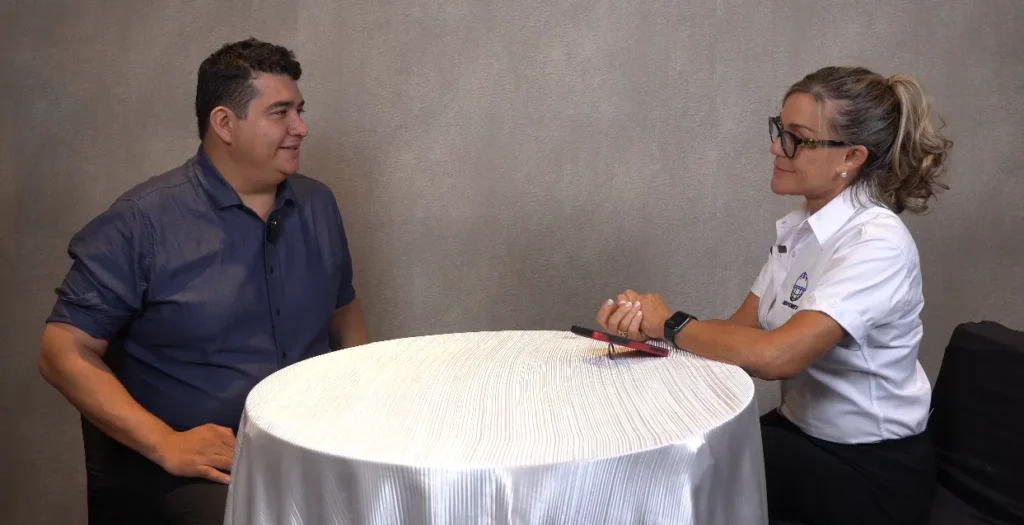Jorge T. Reyna, consultant at JRSA Engineering and instructor at Lerne Courses and Certifications, recently participated in an interview by the Inspenet team at the LatinCORR 2025 event in Panama, where he was recognized for his outstanding career. In the conversation, he shared his vision on the direction that the technical and industrial industry is taking in Latin America and the world.
His trajectory is a clear example of the new paradigm that the energy sector is going through, professional multi-certification as a differentiating element. Reyna has managed to combine in-depth knowledge in coatings, welding, non-destructive testing and even concrete, responding to the growing demand of companies looking for increasingly versatile profiles.
In previous decades, companies valued technicians and engineers who were highly specialized in a specific area, since operations were more linear and projects tended to have large teams with well-defined roles. However, this structure becomes rigid in an environment where projects are more complex, global and demand fast decision-making.
Today, the industry is facing challenges where adaptability and transversality of technical knowledge are fundamental. Companies want professionals who can:
Teams are smaller and tasks are more interdependent, in addition, there are more and more projects that change countries or regulations quickly and companies want to reduce time and costs without sacrificing quality. The result is that an integral profile is more valued, with multiple certifications, capable of adapting to different technical roles as required by the project.
Not so much because you are very specialized in one area, but because they trust you. And because there are also other skills that you draw on and they help you.
Jorge T. Reyna.
Jorge T. Reyna comments that institutions such as AMPP, ASNT and AWS have begun to collaborate much more closely, with the objective of:
A clear example of this collaboration was the event "Codings for the Non-Codings Inspectors" held in Houston, where they joined forces to teach about coatings to professionals coming from other areas, generating a space where technical knowledge from different disciplines was exchanged.
These meetings reflect a cultural change within the organizations themselves, which now value the interoperability of technical knowledge and professional multi-certification. According to Reyna, these types of synergies will continue to be key to accelerating the preparation of technical talent across the continent.

Today, the energy and industrial industry faces a double pressure, first to innovate to remain competitive in the face of technological advances and second to be sustainable, responding to the growing demand for environmental responsibility and operational efficiency. Reyna mentions concrete examples of materials that are setting the pace in this crossover between technical innovation and operational sustainability:
These materials open up new possibilities for the industry, but without multi-certified professionals capable of implementing them, these solutions do not reach their true potential. The polyurea requires expertise in industrial coatings, surface preparation and specific regulations, whereas structural composites involve load assessment, adhesion and non-destructive testing.adhesion and non-destructive testing. Therefore, professional multi-certification then becomes the bridge between technical innovation and operational sustainability.
In the energy and industrial sector, decision making is no longer based solely on empirical experience; increasingly, it requires interpreting technical data in real time. Reyna identifies two challenges for the next decade, data management and the incorporation of technologies such as artificial intelligence. artificial intelligence. The industry is still in the process of adapting, with many technicians not mastering digital tools or speaking English, which limits its growth.
Jorge Reyna recommends to the new generations that:
In a sector where technology is advancing faster than manuals, professional multi-certification has become a strategic tool for those who wish to remain current and competitive. It is no longer enough to master a single specialty; companies need profiles capable of understanding and intervening in various phases of a technical project, from coatings to non-destructive testing.
But beyond the operational benefit, opting for continuous and multidisciplinary training is also a way of exercising leadership. This is demonstrated by Jorge T. Reyna, who has made his career an example of how to train, share and advance without fear of competition.
For more content about LatinCORR 2025, please visit our YouTube channel and our LinkedIn profile.
Source: Inspenet.